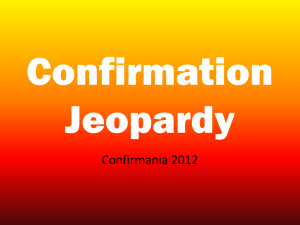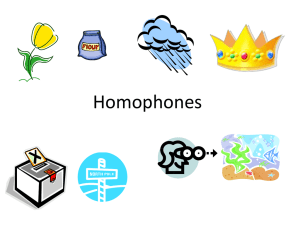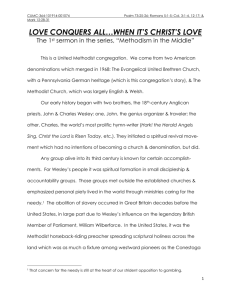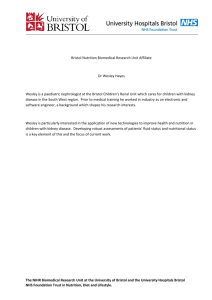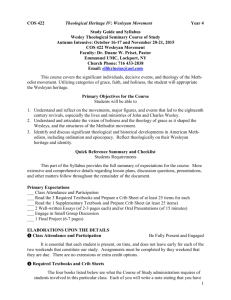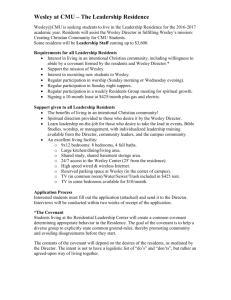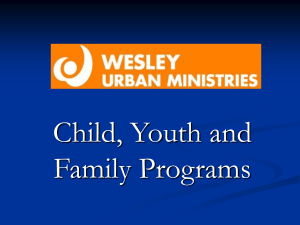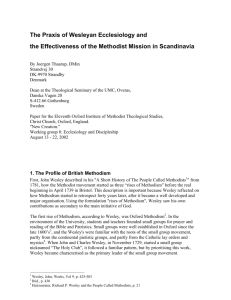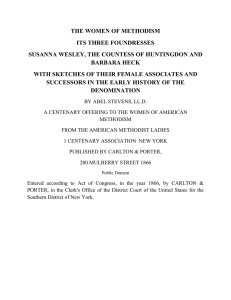COS 422: Wesleyan Movement Mississippi Course of Study
advertisement
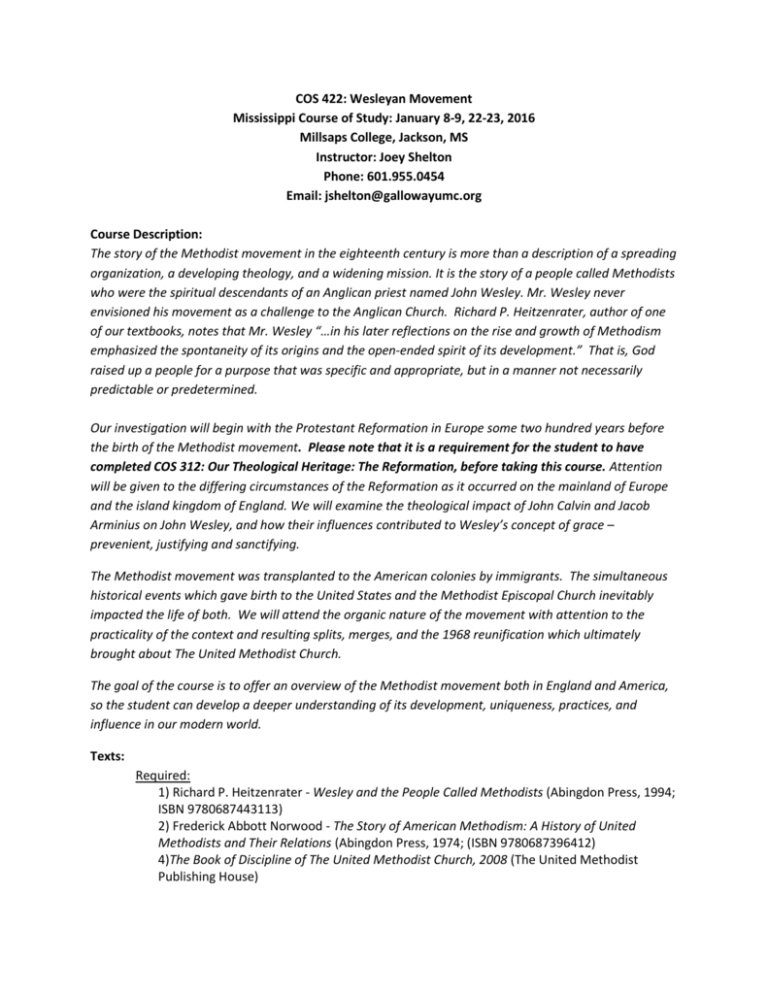
COS 422: Wesleyan Movement Mississippi Course of Study: January 8-9, 22-23, 2016 Millsaps College, Jackson, MS Instructor: Joey Shelton Phone: 601.955.0454 Email: jshelton@gallowayumc.org Course Description: The story of the Methodist movement in the eighteenth century is more than a description of a spreading organization, a developing theology, and a widening mission. It is the story of a people called Methodists who were the spiritual descendants of an Anglican priest named John Wesley. Mr. Wesley never envisioned his movement as a challenge to the Anglican Church. Richard P. Heitzenrater, author of one of our textbooks, notes that Mr. Wesley “…in his later reflections on the rise and growth of Methodism emphasized the spontaneity of its origins and the open-ended spirit of its development.” That is, God raised up a people for a purpose that was specific and appropriate, but in a manner not necessarily predictable or predetermined. Our investigation will begin with the Protestant Reformation in Europe some two hundred years before the birth of the Methodist movement. Please note that it is a requirement for the student to have completed COS 312: Our Theological Heritage: The Reformation, before taking this course. Attention will be given to the differing circumstances of the Reformation as it occurred on the mainland of Europe and the island kingdom of England. We will examine the theological impact of John Calvin and Jacob Arminius on John Wesley, and how their influences contributed to Wesley’s concept of grace – prevenient, justifying and sanctifying. The Methodist movement was transplanted to the American colonies by immigrants. The simultaneous historical events which gave birth to the United States and the Methodist Episcopal Church inevitably impacted the life of both. We will attend the organic nature of the movement with attention to the practicality of the context and resulting splits, merges, and the 1968 reunification which ultimately brought about The United Methodist Church. The goal of the course is to offer an overview of the Methodist movement both in England and America, so the student can develop a deeper understanding of its development, uniqueness, practices, and influence in our modern world. Texts: Required: 1) Richard P. Heitzenrater - Wesley and the People Called Methodists (Abingdon Press, 1994; ISBN 9780687443113) 2) Frederick Abbott Norwood - The Story of American Methodism: A History of United Methodists and Their Relations (Abingdon Press, 1974; (ISBN 9780687396412) 4)The Book of Discipline of The United Methodist Church, 2008 (The United Methodist Publishing House) 5) Gayle Carlton Felton - By Water and the Spirit: Making Connections for Identity and Mission (Discipleship Resources, 2007; ISBN 978-0-88177-201-2) 6) Carolyn K. Tanner- This Holy Mystery: A United Methodist Understanding of Holy Communion (Discipleship Resources, 2006; ISBN 1 -878009-54-0) 7)Don Thorsen - Calvin vs. Wesley: Bringing Belief in Line with Practice (Abingdon Press, 2013; 9781426743351 Supplementary (no expectation of purchase): 1) Kenneth J. Collins - A Real Christian: The Life of John Wesley (Abingdon Press, 1999; ISBN 9780687082469) 2) Russell E. Richey – Marks of Methodism: Theology in Ecclesial Practice (Abingdon Press, 2005; ISBN 9780687329397) 3) Jean Miller Schmidt - Grace Sufficient: A History of Women in American Methodism, 17601939 (Abingdon Press, 1996; ISBN 9780687156757) 4) Thomas Frank - Polity, Practice and Mission of the UMC, 2006 edition (Abingdon Press, 2006; ISBN 9780687335312) 5) William B. McClain – Black People in the Methodist Church: Whither Thou Goest? (Abingdon Press,1984; ISBN 0-687-03588-0) 6) Randy L. Maddox - Responsible Grace: John Wesley’s Practical Theology (Kingswood Books, 1994; ISBN 0687003342) 7)Russell Ritchey, et al, The Methodist Experience in America (Abingdon Press, Volume I; ISBN-10: 0687246725, ISNB-13: 9780687246724; Volume II; ISBN-10: 0687246733; ISBN-13: 9780687246731 Course Outline: January 8-9 The Protestant Reformation in Europe and England Who is John Wesley? The birth and growth of the Methodist Movement Wesleyan Theology: God, Bible, Humanity, Grace Methodism arrives in the colonies January 22-23 Birth of the Methodist Episcopal Church The roots of the EUB Church Schism within the denomination Reunification and the journey towards United Methodism Wesleyan Theology: Salvation, Spirituality, Church, Ministry The UMC: A Global Church Assignments: Pre-course assignment to be completed for the first class meeting – January 8, 2016 Reading: Entire Heitzenrater textbook – Wesley and People called Methodists (NOTE: do not try to memorize tiny details. Pay attention to themes, historical context, and the organic nature of the Wesleyan movement. Consider the personalities and writings that were significant in Wesley’s development). The Book of Discipline (2008) pp. 41-86 Find an additional resource on John Wesley and familiarize yourself with Wesley as a person, preacher, and theologian. (Ken Collins book listed in Additional Resources is excellent.) Thorsen, Calvin vs. Wesley, pp. vii - 57 Written: 1. A. In essay form (1 page) describe the highlights of the Protestant Reformation in mainland Europe and its influence in England. What were the similarities? What were the differences? (Look for the contexts that contributed to Wesley’s thought and methodology). (Or) B. Give a brief summary of the major people and writings that you consider to be the distinctive influences on John Wesley and 3 events which helped mold John Wesley into the spiritual leader he became. (1 page) 2. Define the following theological beliefs as John Wesley understood and taught them (one paragraph each) and give an example of each that you have experienced or witnessed (one paragraph each): Prevenient Grace; Justifying Grace; Sanctifying Grace; The Witness of the Spirit 3. Important questions asked of United Methodist pastors: Are you going on to perfection? Do you expect to be made perfect in love in this life? Are you earnestly striving after perfection in love? In essay form express John Wesley’s concept of Christian Perfection (1 page) and how your understanding of Christian perfection converges or departs from that of Wesley (1 page). To be Completed for class on January 22, 2016 Reading: Chapters 6 – 38 of Norwood textbook, The Story of American Methodism THE SOCIAL PRINCIPLES found in The Book of Discipline pp. 97-131. Thorsen, Calvin vs. Wesley, pp. 58-142 Written: 1. A. In essay form trace the history of Methodism in America, noting significant dates, events and controversies. (2 pages) (Or) B. In the earliest years of the Methodist Movement (1740 – 1755) the whole intent of Methodism was often misunderstood. (Read very carefully pages 128 – 134 of the Heitzenrater textbook). Mr. Wesley’s response was “Methodism is simply genuine Christianity.” Write a two (2) page paper on this circumstance making sure you include how you interpret Mr. Wesley’s response, what the real problem was with those who disagreed with Mr. Wesley, and how Wesley’s approach to preaching the Gospel was a source of controversy during this period. 2. Choose one of the positions of the United Methodist Church on a specific Social Principle as found in The Book of Discipline. Write a paper (2 pages) that gives some historical background on how and why the church came to this particular conclusion. How do Wesleyan ideas of spirituality and ministry inform this position on a social principle? Relate whether you agree or disagree with the church’s position, and how you would counsel a member of your congregation who embraces a different viewpoint than you do. 3. What is your understanding of Methodism and the practice of our 2 sacraments? What was Wesley’s exhortation concerning the sacraments? Describe each sacrament and explain how you attend to them.(2 pages) Instructor’s Expectations: Students are expected to follow the schedule outlined in the syllabus and to be present and on time for each class session. The majority of the class will be conducted in a free and open discussion. One half of the final grade will be determined by the student’s participation in class discussion and evidence that all reading assignments have been completed. All written assignments must be submitted according to the schedule announcement in the syllabus. Papers may be emailed to the instructor before class to ensure that an electronic copy is available. Written assignments account for the other half of the final grade. All written assignments are to be in type form, printed, double spaced, stapled and include course name and student name on each page and be signed by your Mentor. Footnotes and proper citation (credit for sources) is critical. Only in cases of extreme circumstances will consideration be given to making any adjustment to the announced schedule and for this to happen the instructor must be contacted prior to the deadlines given. The instructor can be contacted (a) by phone or text (601.955.0454); or (b) email jshelton@gallowayumc.org
